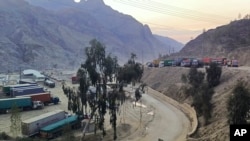Taliban security forces in Afghanistan claimed Sunday that they had killed a key Islamic State commander in an eastern province bordering Pakistan.
An official Taliban media outlet reported that counter-terrorism forces in Nangarhar had raided a hideout of Islamic State Khorasan, also known as IS-K, an Afghan-based affiliate of the transnational extremist group.
The Al-Mersaad outlet said that Sunday’s action had resulted in the killing of “Zakirullah … known as Abu Sher” and identified him as IS Khorasan’s military leader for the border province’s Achin district.
The media report said “Taliban special forces” had concluded the operation in the Mohmand Dara district.
It was not possible to verify Al-Mersaad’s claims from independent sources, nor have Taliban government officials commented on the operation in a province where IS Khorasan launched its extremist activities in Afghanistan and the region at large in 2015, with Achin as its headquarters.
The Taliban returned to power in 2021 when all the United States-led NATO forces withdrew from the country after almost 20 years of involvement in the Afghan war. U.S. forces regularly conducted operations against IS Khorasan and killed several of its key leaders.
The extremist group intensified suicide bombings and other attacks against security forces and members of the Afghan Shiite community after the Taliban takeover. The violence has killed hundreds of people, including prominent Taliban leaders and religious scholars.
Taliban authorities say their sustained military actions against IS Khorasan hideouts have significantly degraded its ability to pose a threat to Afghanistan and beyond.
De facto Afghan authorities have accused Pakistan and Tajikistan of “training and nurturing” IS Khorasan operatives on their respective soils.
Both neighbors of Afghanistan have dismissed the accusation as frivolous and, in turn, blame the de facto rulers in Kabul for failing to prevent transnational terrorist groups from using their territory to threaten regional stability.
A quarterly U.S. Department of Defense report made public in late May noted that Afghanistan-based IS Khorasan had “demonstrated increased transnational terrorism capabilities through large-scale, multiple casualty attacks” in the region.
The report cited a January suicide bombing in neighboring Iran’s Kerman city of a memorial for a top Iranian military commander that killed at least 100 mourners. It added that IS Khorasan gunmen stormed a concert venue near Moscow in March, killing at least 140 people in what was described as the worst terrorist attack in Russia in 20 years.
In March, General Michael Kurilla, the commander of the U.S. Central Command, testified to Congress on the growing terrorist threat emanating from Afghanistan, warning that Islamic State affiliates “retain the capability and the will” to attack the United States and its allies in Europe in as little as six months.
The U.S. quarterly report stated that despite pledging to deny terrorist groups a sanctuary in Afghanistan, the Taliban “continued to privately provide shelter to al-Qaeda senior leaders while publicly denying that al-Qaeda uses its territory to pose threats to outside countries.”
In a January report, the United Nations Security Council said that IS Khorasan “has continued to pose a major threat in Afghanistan and the region despite losses in territory, casualties, and high attrition among senior and mid-tier leadership figures.”











